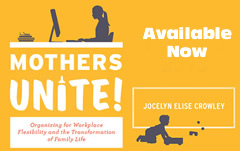Reviews: Mothers Unite!: Organizing for Workplace Flexibility and the Transformation of Family Life
"Mothers Unite! takes us beyond the mommy wars to paint a picture of hope: the prospect of diverse mothers' groups coming together to work for a better future. Jocelyn Elise Crowley intelligently unpacks abstract ideas about flexibility and mothers' solidarity (or lack thereof) to provide a clear road map for moving forward. Her book will open endless avenues for activism on behalf of families. She has made a truly meaningful contribution."
—Judith Warner, author of Perfect Madness: Motherhood in the Age of Anxiety
"Kudos to Jocelyn Elise Crowley for addressing a question that few have dared ask: How can we bridge the real and illusory divides that separate employed and nonemployed women? While others focus on the putative mommy wars, Crowley shows clearly and convincingly that mothers from diverse backgrounds share common interests and possess the potential to become a powerful political force. This book is a must for anyone who cares about creating a more flexible, humane, and family-supportive workplace."
—Kathleen Gerson, Collegiate Professor of Arts & Science, New York University, author of The Unfinished Revolution
"Mothers Unite! helps us understand an issue that completely puzzles citizens from other countries: why the over 70 percent of American women who work outside the home do not mobilize politically around issues of daycare, maternity leave, and flexible work practices. Better still, it offers a blueprint for change. A very interesting read!"
—Anne-Marie Slaughter, Bert G. Kerstetter '66 University Professor of Politics and International Affairs, Princeton University, author of The Idea that Is America: Keeping Faith with Our Values in a Dangerous World
"Mothers Unite! addresses a timely and important topic. The potential for mothers' mobilization takes on special urgency today. Contested images of motherhood play a prominent role in current culture wars, and mothers’ vulnerability is heightened in the prevailing economic and political climate. Jocelyn Elise Crowley’s research on mothers groups’ stances toward workplace flexibility addresses a long-standing conundrum: why are policies that appear to offer benefits to employers and employees alike so infrequently implemented? Crowley’s answer to that question is new and original."
—Pamela Stone, Hunter College and the Graduate Center of the City University of New York, author of Opting Out? Why Women Really Quit Careers and Head Home
"Analyzing five national mothers’ organizations, Rutgers public policy professor Crowley (The Politics of Child Support in America) makes her case for workplace flexibility as the issue most likely to unite American mothers into a coherent, politically effective “Mother’s Movement.” The groups profiled include Christian-based Mothers of Preschoolers (MOPS); Mothers & More, a support group for mothers moving in and out of the workplace; Mocha Moms, a support organization for mothers of color; the National Association of Mothers’ Centers (NAMC), which offers childcare and activities for mothers and children; and MomsRising, an online group that discusses topics of national interest to mothers. Crowley shows that the participants in these groups are mostly looking for community and peer support, and are much less embroiled in the “Mommy Wars” than the media suggest. Both stay-at-home and working mothers see the value in having flexible career options. These groups’ members are mostly middle-class, leaving out some lower-income women who might be most affected by broad policy changes, and aside from Mocha Moms, they are overwhelmingly white. Nevertheless, Crowley’s data shows that these mothers are indeed interested in family-friendly workplace reform, and she optimistically posits that if the groups coordinated their efforts, they could become a force for change."
—Publishers Weekly (June), Reviewed on 05/20/2013.

